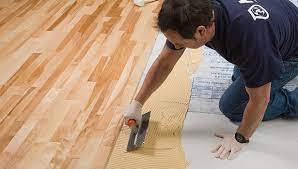Facts About Installing Engineered Hardwood in Mississauga
7 Top Facts About Installing Engineered Hardwood in Mississauga
Engineered
hardwood is quickly becoming a staple for homeowners who want quality flooring…
and for good reason. It offers incredible benefits and is very similar to
traditional hardwood. In fact, it is a great solution for homes and offices
alike.
But what does it mean to you?
When
putting in any type of flooring, it is recommended that you understand the
product thoroughly before buying. So, here are some important facts about
installing engineered hardwood in
Mississauga or
anywhere else.
Let’s
begin.
Things to Know About Engineered
Hardwood Flooring
Engineered
hardwood is a great solution for both residential and commercial spaces. But
how well do you know it?
What is engineered hardwood
flooring?
Engineered
hardwood’s predecessor, particle board, was invented by German inventor Max Himmelheber in 1932. It was not
until the 1960s that it would make its debut as an alternative flooring
material. Needless to say, engineered hardwood has improved remarkably over the
years.
Engineered
hardwood flooring is composed of a hardwood veneer and plywood core glued
together under tremendous pressure. It is a great solution for those in need of
a hardwood alternative.
Now,
let's have a look at some things you should know about engineered hardwood
flooring in Mississauga and anywhere else.
- It Is Not Laminate
A
common misconception is that engineered hardwood is laminate flooring or fake
wood. This is untrue. Engineered hardwood has a top layer of real hardwood with
a plywood core.
Laminate
and vinyl on the other hand feature high-quality images that imitate actual
hardwood.
Engineered
hardwood is available in oak, maple, and exotic wood variants. The thickness of
the veneer differs from product to product.
- It Is Durable and Resilient
Need
high-performing wooden floors but don’t want traditional ones? Engineered
hardwood is the answer. Unlike traditional hardwood, which cannot be installed
in high humid areas, engineered hardwood fits right in.
Its
plywood core makes it a stronger and more durable flooring option for changing
climates. Some products are also compliant with radiant heating.
- It Can Be Installed On Any Floor
Engineered
hardwood is stable. This is why it can be installed on any level of your home.
Certain
rooms in your home, such as bathrooms and kitchens, tend to have a higher
moisture level.
Make
sure the product you are installing has the manufacturer’s recommendation for
installation in such areas.
- It Can Only Be Refreshed a Limited Number of Times
Wear
and tear is normal, even unavoidable, but having the chance to refinish your
existing floors can lend them a new lease on life.
Unlike
traditional hardwood floors, which can have several refinishes, engineered
hardwood is somewhat limited.
The
number of refinishes depends on the thickness of the top layer. Once that wears
off, you will need to replace it completely.
|
Question:
Do you know how to choose engineered
hardwood flooring
correctly? If not, then it’s better you do your research to avoid unpleasant
surprises. |
- It Can Be Installed Over Any Type Of Subfloor
Certain
flooring materials such as traditional wood flooring cannot be installed directly over
just any subfloor. They require significant preparation which may add to your
costs.
The
good news for people investing in engineered flooring is that it can be
installed on any type of subfloor as long as it is smooth. This means faster
and more efficient installation.
- There Is a Wide Variety Available
Since
engineered hardwood flooring is composed of real hardwood, you get a lot of
variety in terms of species with different colours. So, if you like hickory,
maple, oak or some exotic species, you will find it in various widths and
colours.
- It Is Cost-Effective in the Long Run
Compared
to real hardwood floors, engineered hardwood is more affordable. However, if
you are looking for even more affordable options, try vinyl or laminates. The
best way to go about it is to search online to look for the most affordable
option. This flooring offers great resale value and helps to increase your
property’s ROI.
We
hope this article was helpful in understanding engineered wood flooring. Always
make sure to hire professional installers to avoid future hassles. Subpar or
improper installation can damage your floors leading to extra costs. Always do
plenty of research before investing in any flooring material. Get in touch with
reputable flooring installers near you to complete your
project.




Comments
Post a Comment